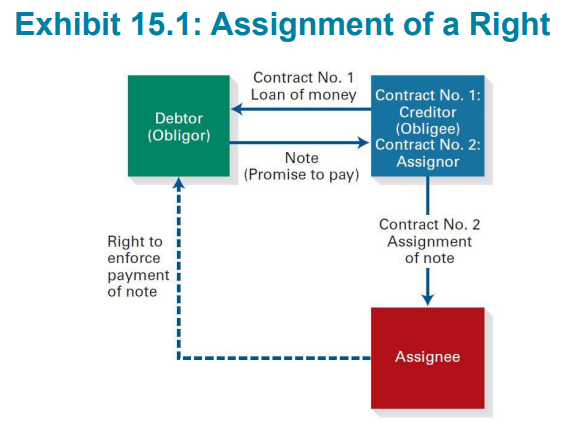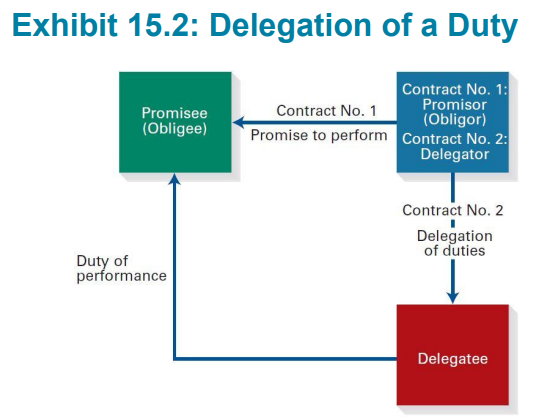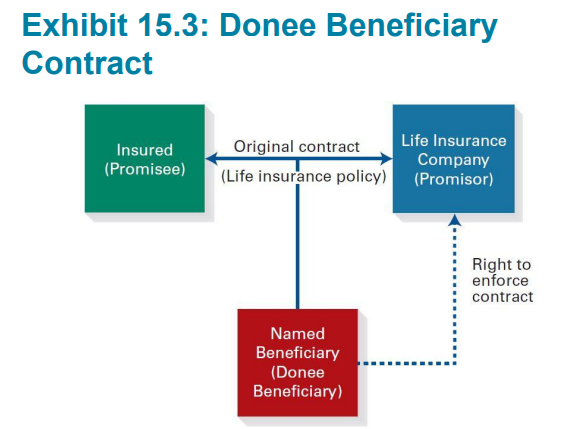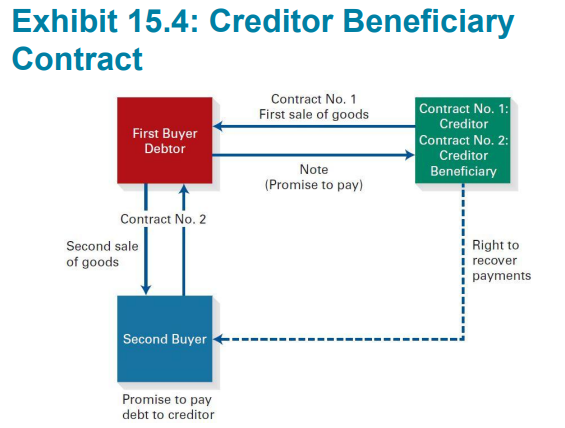Chapter 15: Third-Party Rights and Discharge
1/33
There's no tags or description
Looks like no tags are added yet.
Name | Mastery | Learn | Test | Matching | Spaced | Call with Kai |
|---|
No analytics yet
Send a link to your students to track their progress
34 Terms
Third-Party Rights and Discharge
Privity of contract is the relationship between the parties to a contract
Contracting parties have a legal obligation to perform the duties specified in their contract
A party’s duty of performance may be discharged by agreement of the parties, excuse of performance, or operation of law
If one party fails to perform as promised, the other party may enforce the contract and sue for breach
Third parties do not acquire any rights under other people’s contract unless the person enforcing the contract is a:
Assignee to whom rights are subsequently transferred
Intended third-party beneficiary to whom the contracting parties intended to give rights under the contract at the time of contracting
Assignment of a Right
Assignment (assignment of a right) is the transfer of contractual rights by obligee to another party
Form of Assignment
Obligor: a party who owes a duty of performance under a contract
Obligee: a party who is owed a right under a contract
Assignor: an obligee who transfers a right
Assignee: the party to whom a right is transferred
Generally, no formalities are required for a valid assignment of rights
Although the assignor often uses the word assign, other words or terms, such as sell, transfer, convey, and give, are sufficient to indicate intent to transfer a contract right

Unassignable Rights:
Personal service contract
Assignment of a future right
Contract where an assignment would materially alter the risk
Assignment of a legal action
Personal Service Contract [Unassignable Rights]
Contracts for the provision of personal services are generally not assignable
Example A famous actor signs a contract with a movie studio whereby she agrees to star in a romantic comedy. The movie studio cannot assign the actor’s contract to another movie studio because it is a personal service contract.
The parties may agree that a personal service contract may be assigned
Assignment of a Future Right [Unassignable Rights]
Usually, a person cannot assign a future right, a currently nonexistent right that the person expects to have in the future
Example Henrietta, an heiress worth millions of dollars, signs a will, leaving all her property to her granddaughter Anastasia. Anastasia has only an expected future right, not a current right, to the money. Anastasia cannot lawfully assign her expected future right to receive her inheritance. The assignment would be invalid.
Contract Where an Assignment Would Materially Alter the Risk [Unassignable Rights]
A contract cannot be assigned if the assignment would materially alter the risk or duties of the obligor
Example Consuelo, who has a safe driving record, purchases automobile insurance from an insurance company. Consuelo cannot assign her rights to be insured to another driver because the assignment would materially alter the risk and duties of the insurance company.
Assignment of a Legal Action [Unassignable Rights]
The right to sue another party for a violation of personal rights cannot usually be assigned
A legal right that arises out of a breach of contract may be assigned
Effect of an Assignment of a Right
Where there has been a valid assignment of rights, the assignee “stands in the shoes of the assignor”
That is, the assignor is entitled to performance from the obligor
The unconditional assignment of a contract right extinguishes all the assignor’s rights, including the right to sue the obligor directly for nonperformance
An assignee takes no better rights under the contract than the assignor had
An obligor can assert any defense he or she had against the assignor or the assignee
An obligor can raise the defenses of fraud, duress, undue influence, minority, insanity, illegality of the contract, mutual mistake, or payment by worthless check of the assignor, against enforcement of the contract by the assignee
The obligor can also raise any personal defenses (e.g., participation in the assignor’s fraudulent scheme) he or she may have directly against the assignee
Notice of Assignment
When an assignor makes an assignment of a right under a contract, the assignee is under a duty to notify the obligor that
The assignment has been made, AND
Performance must be rendered to the assignee
If the assignee fails to provide notice of assignment to the obligor, the obligor may continue to render performance to the assignor, who no longer has a right to it
The assignee cannot sue the obligor to recover payment because the obligor has performed the original contract
The assignee’s only course of action is to sue the assignor for damages
The result changes if the obligor is notified of the assignment but continues to render performance to the assignor
In such situations, the assignee can sue the obligor and recover payment
The obligor will then have to pay twice: once wrongfully to the assignor and then rightfully to the assignee
The obligor’s only recourse is to sue the assignor for damages
Anti-Assignment Clause
An anti-assignment clause prohibits assignment of rights under the contract
Used when an obligor does not want to deal with or render performance to an unknown third party
Approval Clause
An approval clause permits the assignment of the contract only upon receipt of an obligor’s approval
Where there is an approval clause, many states prohibit the obligor from unreasonably withholding approval
Successive Assignments of the Same Right
American Rule (New York Rule)
The American rule (New York rule) provides that the first assignment in time prevails, regardless of notice
Most states follow this rule
English Rule
The English rule provides that the first assignee to give notice to the obligor (the person who owes the performance, money, duty, or other thing of value) prevails
Possession of Tangible Token Rule
The possession of tangible token rule provides that under either the American or English rule, if the assignor makes successive assignments of a contract right that is represented by a tangible token, such as a stock certificate or a savings account passbook, the first assignee who receives delivery of the tangible token prevails over subsequent assignees
The first assignee who receives delivery of the tangible token prevails over subsequent assignees
Delegation of a Duty
Delegation of duty is a transfer of contractual duties by the obligor to another party for performance
Delegator: an obligor who transferred his or her duty
Delegatee: a party to whom the duty has been transferred
Generally, no special words or formalities are required to create a delegation of duties

Duties that Can and Cannot Be Delegated
Duties that Can Be Delegated
Duties performed by qualified employees
Example If a client retains a firm of lawyers to represent him or her, the firm can delegate the duties under the contract to any qualified member of the firm.
Duties that Cannot Be Delegated
If an obligee has a substantial interest in having an obligor perform the acts required by a contract, these duties cannot be transferred
This restriction includes obligations under the following types of contracts:
Personal service contracts calling for the exercise of personal skills, discretion, or expertise
Example If a famous singer is hired to give a concert on a college campus, another singer cannot appear in her place.
Contracts whose performance would materially vary if duties were delegated
Example If a person hires an experienced surgeon to perform a complex surgery, a recent medical school graduate cannot be substituted to perform the operation.
Effect of Delegation of Duties
The liability of the delegatee is determined by the following rules:
Assumption of Duties: where a valid delegation of duties contains the term assumption or other similar language, there is an assumption of duties by the delegatee
Here, the obligee can sue the delegatee and recover damages from the delegatee for nonperformance or negligent performance by the delegatee
Declaration of Duties: where there is a valid delegation of duties but the delegatee has not assumed the duties under a contract
Here, the delegatee is not liable to the obligee for nonperformance or negligent performance, and the obligee cannot recover damages from the delegatee
In either form of delegation, the delegator remains legally liable for the performance of the contract
If the delegatee does not perform properly, the obligee can sue the obligor-delegator for any resulting damages
Anti-Delegation Clause
An anti-delegation clause prohibits the delegation of duties under the contract
Anti-delegation clauses are usually enforced
Some courts, however, have held that duties that are totally impersonal in nature—such as the payment of money—can be delegated despite such clauses
Assignment and Delegation
An assignment and delegation occurs when there is a transfer of both rights and duties under a contract
If the transfer of a contract to a third party contains only language of assignment, the modern view holds that there is corresponding delegation of the duties of the contract
Third-Party Beneficiaries
A third-party beneficiary is a third party who benefits by the performance by others of the others’ contracts
Third parties are either intended or incidental beneficiaries
Intended Beneficiary
An intended third-party beneficiary is a third party who is not in privity of a contract but who has rights and can enforce the contract against the promisor
Examples The beneficiary may be expressly named in a contract from which he or she is to benefit (“I leave my property to my daughter Yu Yan”) or may be identified by another means (“I leave my property to all my children, equally”).
Intended third-party beneficiaries are sometimes classified as either (1) donee or (2) creditor beneficiaries
Case 15.1 Third-Party Beneficiary
Case
Cline v. Homuth
Ct. of Appeal of California, 235 Cal.App.4th 699 (2015)
Facts
Plaintiff’s grandson was responsible for a car wreck while under Plaintiff’s supervision
Defendant executed a release that released the driver “and any other person . . . responsible in any manner or degree”
Issue
Was Plaintiff an intended beneficiary of the release signed by Defendant?
Decision
The court of appeal found that Homuth was an intended beneficiary of the release and affirmed the trial court’s grant of summary judgment in her favor
Type 1: Donee Beneficiary [Intended]
A donee beneficiary contract is a contract intended to confer a benefit or gift on an intended third party
The promisee is the contracting party who directs that the benefit be conferred on another
The promisor is the contracting party who agrees to confer performance for the benefit of the third person
The donee beneficiary is the third person on whom the benefit is to be conferred
If the promisor fails to perform the contract, the donee beneficiary can sue the promisor directly

Type 2: Creditor Beneficiary [Intended]
A creditor beneficiary contract usually arises in the following situation:
A debtor (promisor) borrows money from a creditor (promisee) to purchase some item
The debtor signs an agreement to pay the creditor the amount of the loan plus interest
The debtor sells the item to another party before the loan is paid
The new buyer (new promisor) promises the original debtor (new promisee) that he or she will pay the remainder of the loan amount to the original creditor
A creditor beneficiary is an original creditor who becomes a beneficiary under the debtor’s new contract with another party
If the new debtor (promisor) fails to perform according to the second contract, the creditor beneficiary may either (1) enforce the original contract against the original debtor-promisor or (2) enforce the new contract against the new debtor-promisor
However, the creditor can collect only once

Incidental Beneficiary
An incidental beneficiary is a third party who is unintentionally benefited by other people’s contracts
An incidental beneficiary has no rights to enforce or sue under other people’s contracts
Generally, the public and taxpayers are only incidental beneficiaries to contracts entered into by the government on their behalf
As such, they acquire no right to enforce government contracts or to sue parties who breach these contracts
Case 15.2 Third-Party Beneficiary
Case
Does Ⅰ-Ⅺ, Workers in China, Bangladesh, Indonesia,
Swaziland, and Nicaragua v. Wal-Mart Stores, Inc.
U.S. Ct. of Appeals for the 9th Cir., 572 F.3d. 677 (2009)
Facts
Defendant requires its suppliers to adhere to various standards
Plaintiffs, foreign workers, alleged that their employers violated these standards
Issue
Are the Plaintiffs intended third-party beneficiaries under Defendant’s contracts with its foreign suppliers?
Decision
The U.S. court of appeals held that the plaintiff foreign workers were not intended third-party beneficiaries to Walmart’s contracts with its foreign suppliers
The U.S. court of appeals affirmed the dismissal of the plaintiffs’ case
Covenants
A covenant is an unconditional promise to perform
Nonperformance of covenant is breach of contract that gives the other party the right to sue
Example Seed Company borrows $500,000 from Rural Bank and signs a promissory note to repay the $500,000 plus 10 percent interest in one year. This promise is a covenant. That is, it is an unconditional promise to perform.
Conditions
A conditional (qualified) promise is a situation in which a promisor’s duty to perform or not perform a contract arises only if a condition does or does not occur
A condition is a qualified or conditional promise that becomes a covenant if met
Generally, contract language such as if, on condition that, provided that, when, after, and as soon as indicates a condition
A single contract may contain numerous conditions that trigger or excuse performance
There are three primary types of conditions:
Conditions Precedent
Conditions Subsequent
Concurrent Conditions
1. Condition Precedent [Condition]
A condition precedent is a condition that requires the occurrence of an event before a party is obligated to perform a duty under a contract
The happening (or nonhappening) of the event triggers the contract or duty of performance
If the event does not occur, no duty to perform the contract arises because there is a failure of condition
Example An accounting firm offers Dylan, a student in college, a job. However, the contract contains a provision that Dylan must maintain a 3.0 GPA, or the offer will be rescinded.
Some contracts reserve the right to a party to pay for services provided by the other only if the services meet the first party’s “satisfaction”
The courts have developed two tests: (1) the personal satisfaction test and (2) the reasonable person test to determine whether this special form of condition precedent has been met
Test 1: Personal Satisfaction Test
The personal satisfaction test is a subjective test that applies to contracts involving personal taste and comfort
Ex: contracts for interior decorating, tailoring clothes
The only requirement is that the person given the right to reject the contract acts in good faith
Test 2: Reasonable Person Test
The reasonable person test is an objective test that applies to commercial contracts and contracts involving mechanical fitness and most commercial contracts
Most contracts that require the work to meet the satisfaction of a third person (e.g., engineer, architect) are judged by this standard
2. Condition Subsequent [Condition]
A condition subsequent is a condition in which the occurrence or nonoccurrence of a specific event automatically excuses the performance of an existing contractual duty to perform
That is, failure to meet the condition subsequent relieves the other party from obligation under the contract
Example An accounting firm offers Dylan, a college student, a job. However, the contract contains a provision that Dylan must pass the CPA exam within one year of his hire date or the employment contract may be terminated.
3. Concurrent Conditions [Condition]
A concurrent condition is a condition that exists when the parties to a contract must render performance simultaneously
Each party’s absolute duty to perform is conditioned on the other party’s absolute duty to perform
Express vs. Implied Condition
An express condition exists if parties expressly agree to terms
“Time is of the essence” is a condition used in contracts that designates that the performance of the contract by a stated time is an express condition and that there is a breach of contract if the contracting party does not perform by the stated date
An implied-in-fact condition is a condition that can be implied from the circumstances surrounding the contract and conduct of the parties
Discharge of Performance
A party’s duty to perform under a contract may be discharged by (1) mutual agreement of the parties or by (2) impossibility of performance
Type 1: Discharge by Agreement [Discharge of Performance]
Discharge by agreement is the discharge of contractual duties under a contract by mutual assent of the parties
There are different methods for discharging a contract by mutual agreement
(1) Mutual Rescission
Mutual rescission is mutual termination of a contract that occurs when the parties to a contract enter into a second contract that expressly terminates the first one
Unilateral rescission is an attempt by one party to a contract to terminate the contract without the other party’s consent
Not effective and constitutes a breach of that contract
(2) Substituted Contract
A substituted contract is a contract that contracting parties enter into that revokes and discharges an existing contract and is a substitute for the first contract
If one of the parties fails to perform his or her duties under a substituted contract, the nonbreaching party can sue to enforce its terms against the breaching party
The prior contract cannot be enforced against the breaching party because it has been discharged
(3) Novation
Novation is an agreement that substitutes a new party for one of the original contracting parties and relieves the exiting party of liability on the contract
The new substituted party is obligated to perform a contract
All three parties must agree to the substitution
In a novation, the exiting party is relieved of liability on the contract
(4) Accord and Satisfaction
Accord and satisfaction is the settlement of a contract dispute
The agreement whereby the parties agree to accept something different in satisfaction of the original contract is called an accord
The performance of an accord is called a satisfaction
An accord does not discharge the original contract, it only suspends it until the accord is performed
Satisfaction of the accord discharges both the original contract and the accord
If an accord is not satisfied when it is due, the aggrieved party may enforce either the accord or the original contract
Type 2: Impossibility of Performance [Discharge of Performance]
Objective impossibility is nonperformance that is excused if a contract becomes impossible to perform
The impossibility must be an impossibility (“it cannot be done”) rather than a subjective impossibility (“I cannot do it”)
Examples:
Death or incapacity of promisor prior to performance of personal service contract
Destruction of subject matter
Supervening illegality
Force Majeure Clause
The force majeure clause is a clause in a contract in which the parties specify certain events that will excuse nonperformance
Example A force majeure clause usually excuses nonperformance caused by natural disasters such as floods, tornadoes, and earthquakes. Modern clauses also often excuse performance due to labor strikes, shortages of raw materials, and the like.
Statute of Limitations
A statute of limitations is a statute that establishes the period during which a plaintiff must bring a lawsuit against a defendant
If the lawsuit is not brought within this period, the injured party loses the right to sue
The usual period for bringing a lawsuit for breach of contract is one to five years